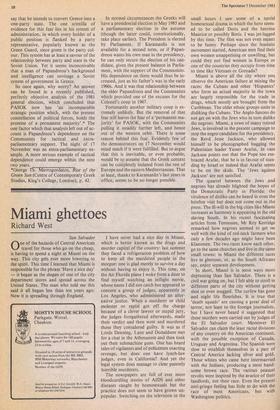Miami ghettoes
Richard West
San Salvador One of the hazards of Central American travel for those who go on the cheap, is having to spend a night at Miami on the way. This city gets ever more lowering to the spirit. This time I learned that Miami is responsible for the phrase 'Have a nice day' — it began as the slogan of one of the city department stores and spread across the United States. The man who told me this said it all began less than ten years ago. Now it is spreading through England.
I have never had a nice day in Miami, which is better known as the drugs and murder capital of the country: last summer they faced a refrigeration problem of how to keep all the murdered people in the morgue: one is glad merely to survive a day without having to enjoy it. This time, on the Air Florida plane I woke from a doze to find myself watching an inflight movie, whose name I did not catch but appeared to concern a group of judges, apparently in Los Angeles, who administered an alter- native justice, When a murderer or child molester or rapist got off the charge because of a clever lawyer or stupid jury, the judges foregathered afterwards, made their verdict and then went and murdered those they considered guilty. It was as if Lords Denning, Lane and Donaldson met for a chat in the Athenaeum and then took out their submachine guns. One has heard tales of vigilantes and of policemen exacting revenge, but does one have lynch-law judges, even in California? And yet the legal system does manage to clear patently horrible murderers.
The newspapers are full of ever more bloodcurdling stories of AIDS and other diseases caught by homosexuals but the practice does not seem to have grown un- popular. Switching on the television in the small hours I saw some of a torrid homosexual drama in which the hero seem- ed to be called Doris and the heroine Maurice or possibly Boris. I was jet-lagged by this time. The film was not even meant to be funny. Perhaps since the feminist movement started, American men find their own women unappetising or unwilling, but could they not find women in Europe or one of the countries they occupy from time to time like Vietnam or Grenada?
Miami is above all the city where you observe the American failure at mixing the races: the Cubans and other 'Hispanics' who form an actual majority in the town are largely responsible for the trade in drugs, which mostly are brought from the Caribbean. The older ethnic groups unite in disliking the Cubans. The Anglo-Saxons do not get on with the Jews who in turn dislike the negroes. Miami, a town of many retired Jews, is involved in the present campaign to stop the negro candidate for the presidency, the Revd Jesse Jackson, who allowed himself to be photographed hugging the Palestinian leader Yasser Arafat. In vain Jackson points out that the Pope too em- braced Arafat, that he is in favour of stan- ding by Israel or indeed that Arafat seems to be on the skids. The `Jews against Jackson' are not satisfied.
The quarrel between the Jews and negroes has already blighted the hopes of the Democratic Party in Florida: the virulence of dislike can be heard in even the briefest visit but does not come out in the press. The ill-will in the big cities like Miami increases as harmony is appearing in the old slaving South. In his recent fascinating articles from Tennessee, Mr Roy Kerridge remarked how negroes seemed to get on well with the kind of red-neck farmers who only a few decades ago might have been Klansmen. The two races know each other, go to the same churches and live in the same small towns: in Miami the different races live in ghettoes, or, as the South Africans say, enjoy separate development.
In short, Miami is in most ways more depressing than San Salvador. There is a civil war going on, but I felt able to stroll in different parts of the city without getting shot or even mugged. The curfew has gone and night life flourishes. It is true that `death squads' are causing a great deal of terror, not least to the foreign journalists, but I have never heard it suggested that these murders were carried out by judges of the El Salvador court. Moreover El Salvador can claim the least racial divisions of any country on the American continent, with the possible exception of Canada, Uruguay and Argentina. The Spanish were slow to establish themselves in a part of Central America lacking silver and gold. Those whites who came here intermarried with the Indians, producing a most hand- some brown race. The various peasant revolts were inspired by the avarice of their landlords, not their race. Even the present anti-gringo feeling has little to do with the race of most Americans, but with Washington politics.














































 Previous page
Previous page